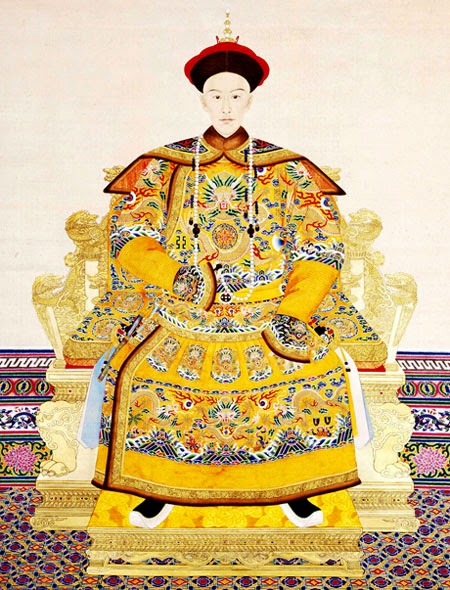 |
| Guangxu (Kuang-hsu) |
Guangxu’s personal name was Zaitian (Tsai-t’ien). He was born in 1871 and chosen emperor by the dowager empress Cixi (Tz’u-hsi) when her son and his cousin the emperor Tongzhi (T’ung-chih) died without heirs.
His youth ensured another long regency by the ambitious and unscrupulous Cixi. Guangxu was bright and studious, studied English and traditional subjects under able tutors, and grew up to be a man of character and moral convictions.
In 1889 Cixi married him to her niece in order to increase her web of control over him, and though she then formally retired to her luxurious Summer Palace, she continued to dictate policy and make key appointments, leaving Guangxu practically powerless.
  |
China’s catastrophic defeat by Japan in the Sino-Japanese War (1894–1895) convinced Guangxu that dramatic and immediate reforms were needed to save the nation. He therefore supported a group of reformers led by Kang Youwei (K’ang Yu-wei) in 1898 and promulgated laws that would modernize China modeled on Japan’s Meiji Restoration.
He was betrayed to Cixi by General Yuan Shikai (Yuan Shih-k’ai), who struck quickly to imprison Guangxu, crushing the reformers, who were killed, imprisoned, or exiled. In retrospect, Guangxu’s attempt to change China was called the Hundred Days of Reform.
It is believed that Cixi wanted to dethrone or kill Guangxu but was prevented from doing so due to protests by powerful provincial governors and through diplomatic influence of the Western powers.
Cixi’s reactionary rule culminated in the Boxer Rebellion, the besieging of foreign diplomatic compounds in Beijing (Peking) by her supporters, the Boxers, and the capture of the capital by Western relief forces in 1900.
She decided to flee the capital and took the captive emperor with her, murdering his courageous consort Zhen Fei (Chen-fei) for suggesting that he stay behind to negotiate with the Western powers.
When the fugitive Cixi and the court returned to Beijing in 1902 after the settlement of the Boxer fiasco, she made Guangxu take the blame for what had happened.
Guangxu endured his imprisonment with patience, reading and preparing for the day when he would be free to rule after his adoptive mother died. She died from illness on November 15, 1908, at 73, at which time the palace announced that he had suddenly died on the previous day at age 37.
It is widely believed that he died an unnatural death at the hands of her supporters, with or without her consent. Thus ended the tragic life of Emperor Guangxu, who could never escape the control of his vicious aunt/adoptive mother.
Before her death Cixi had named her infant great-nephew successor of the childless Guangxu. The boy ruled as Emperor Xuantong (Hsuan-tung) between 1909–11; he was the last emperor of the Qing dynasty.